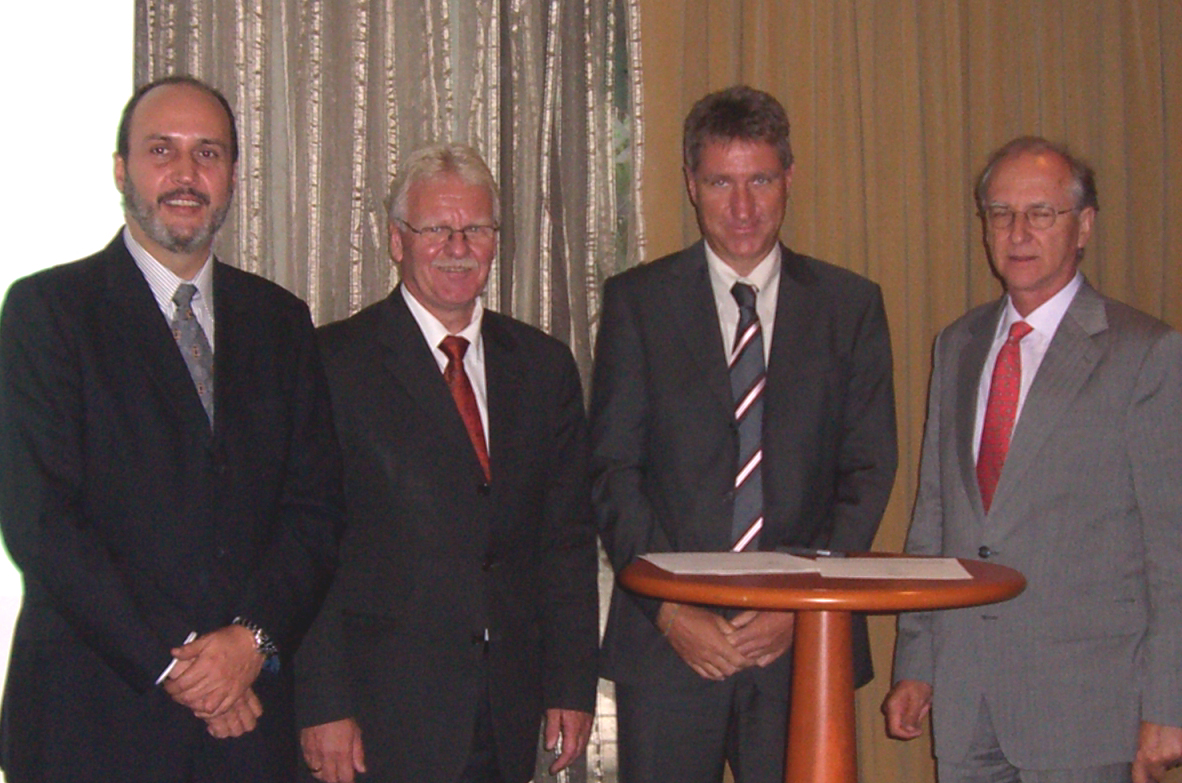|
Caption: Carlos Arango, CNPMLTA, Xaver Edelmann, Empa, Heinz Boeni, Empa, and Joerg Al. Reding, SECO
(l-to-r) celebrating the successful results to date of the technical cooperative programs between Switzerland and Columbia.
The most visible result of the «Cleaner Production Program» is the Environmental Technology Center in Medellin, the «Centro Nacional de Producción Más Limpia y Tecnologías Ambientales de Colombia», (www.cnpml.org), an organization consisting of over thirty members drawn from industry, academia and the administration. Over the past nine years the center has, with international support and through the efforts of its staff of about 25, advised around 900 enterprises on resource-efficient production processes, released more than a hundred publications and been host to the over ten thousand participants of some 400 courses it has organized on sustainable production technologies. The center, which is today 100% self-supporting (financed through the services it offers), is also active in eleven other Latin American countries. A scheme offering green credit, financed in part by SECO and operated through local banks, was a resounding success. This method of funding encourages the use of environmentally friendly technologies in Columbian industries through credit at favorable rates and financial guarantees when significant reductions in environmental pollution are achieved. (www.lineadecreditoambiental.org).
10 years of Empa «Capacity Building» - the proud results
There were many such success stories to be heard at the celebration in Medellin, which was attended by about 60 delegates from the economic, academic and administrative sectors. The guests included Maria del Pilar Pardo, the Columbian Deputy Minister of the Environment, and Ambassador Jörg Al. Reding, SECO’s head of Cooperation and Development. The beginnings of the partnership go back as far as the year 1995, when Empa, represented by Xavier Edelmann’s staff, held the first discussions with their Columbian colleagues about the establishment of an environmental technology center in the country. A year after the first project agreement was signed in 1997 the then Federal Office for External Economics (today SECO) tasked Empa with setting up and overseeing a technical cooperation program, releasing five million Swiss francs of funding for the project.
A milestone was achieved in 2005 with the signing of a common «Memorandum of Understanding» between Empa and the University of Antioquia. Several degree projects and doctoral dissertations have been completed within the framework of this cooperative work. Meanwhile the memorandum has been ratified and converted into a collaboration agreement. According to a study by «Colciencias», the Columbian Institute for the Development of Science and Technology, the University of Antioquia ranks as the country’s leading academic educational institution.
Another highlight is the project to develop financial models for the sustainable economic exploitation of the tropical forest in the Rio Negro region. This work was initiated in 2001 by Empa and «CORNARE», the regional environmental authority, on behalf of the ITTO, the International Tropical Timber Organization and is jointly financed by Switzerland, the USA and Japan. Following the festive ceremony, Ambassador Reding, representatives of the Swiss Embassy and Peter Welther, the President of the Swiss-Columbian Chamber of Commerce, paid a visit to the project site. The aim of the program is to help introduce sustainable measures for economically exploiting the timber following the guidelines of the UNFCCC, the United Nations Framework Convention on Climate Change. The efficient and sustainable use of resources is rewarded by the awarding of so-called Emission Reduction Certificates which can be sold to the World Bank’s Bio Carbon Fund. In addition the sale of the ecologically harvested timber products is also encouraged and certificates attesting to their environmentally friendly production methods are issued. The project has achieved exemplary status, a “model case” showing how to provide alternative sources of income for rural inhabitants and so helping combat the population drift to the cities and enhancing the chances of success of peace-keeping efforts.
A New Phase of Collaboration Begins
After ten successful years, the partnership between the two countries is now entering a new phase. New projects are being initiated with the support of SECO in the areas of bio-energy and climate protection, as well as in the recycling of electronic and electrical waste (e-waste). In addition, new research projects are beginning as part of the collaborative work with the University of Antioquia. “In future the cooperative efforts between Switzerland and Columbia will concentrate on the encouragement of sustainable product cycles for bio-energy and for electronic products, with the aim of raising resource productivity and of closing material life cycles,” explains Xaver Edelmann.
Technical Information:
Heinz Boeni, Empa Technology & Society, Tel. +41 71 274 78 58,
Editor:
Dr. Michael Hagmann, Communication Dept., Tel. +41 44 823 45 92,
|

